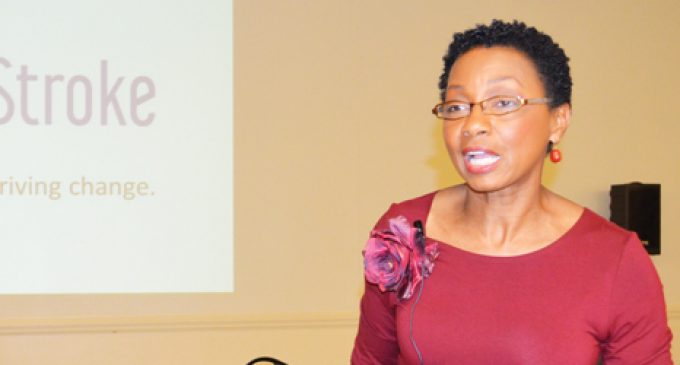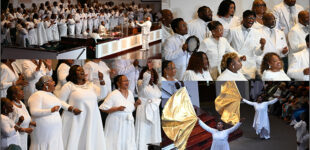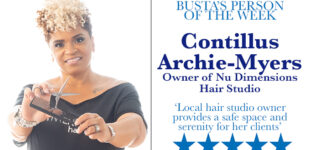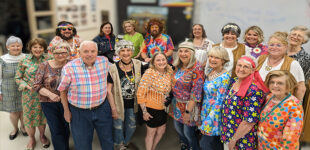Victim: Stroke can strike at any age

Amy Edmunds was the picture of health when she had a stroke at age 43.
She maintained a healthy diet and weight, exercised regularly and frequently ran in 5ks. To this day, 10 years after the stroke, Edmunds says her doctors are baffled and still can’t point to what may have caused the stoke.
“I think God just wanted to give me an assignment,” stated Edmunds, a full time lecturer at Coastal Carolina University in South Carolina and founder and executive director of YoungStroke, Inc. “He just wanted to give me something to talk about.”
And talk about it she has. Edmunds has become a passionate advocate for young stroke awareness. Those who suffer a stroke before age 65 are included in youth stroke statistics. Edmunds, speaking at a Young Stroke Awareness Conference at Winston-Salem State University last Thursday, said stroke is affecting more and more younger Americans.
“We thought, and still do think, that stroke is an affliction of old age. Stroke can happen at any age – that’s one of the messages that you need to take back to your communities,” said Edmunds, whose organization presented the conference, along with WSSU’s Center of Excellence for the Elimination of Health Disparities (CEEHD).
“(With) people who have been admitted to the hospitals for stroke, we’ve had an increase in people from the ages of 15-44,” reported CEEHD Executive Director Dr. Sylvia Flack. “Stroke in Forsyth County is one of the big reasons that we have a lot of young people on the disabled list.”
Though she has traveled nationally and internationally to speak about the importance of researching and understanding young stroke, the conference at WSSU was a first for Edmunds.
“Winston-Salem State is the first historically black university that I’ve been able to make this presentation to,” she revealed. “And certainly the message couldn’t be more relevant to this particular college audience, because minorities are disproportionately impacted, and of course that goes for young stroke survivors as well.”
One in five strokes in America strikes people between the ages of 20 and 55, Edmunds revealed, and that number is on the rise. Between 1995 and 2008, the number of Americans ages 15 to 44 hospitalized for stroke rose by more than one-third, according to the Center for Disease Control and Prevention.
High Point resident Penny Castro said she never imagined that at 59 she might be at risk for stroke, but the thunderclap headache that signaled the onset of a stroke just after finishing her shift at CenterPoint Human Services in April was a wake-up call.
Castro – who had received a clean bill of health from her doctor just before the stroke – said that as a relatively young woman, she was in the distinct minority at the Novant Health Stroke and Neurosciences Center, where she spent seven days recovering from her ordeal.
“When I was at the stroke clinic, doctors and nurses frequently commented, ‘You’re awfully young for this to happen,’” said Castro, who has since changed her diet and dropped 30 pounds in hopes of reducing her stroke risk.
Despite the prevalence of occurrences among younger generations, little has been done to address the unique challenges young stroke survivors face. Many young stroke victims are still rearing families and working, yet most post-stroke programs aren’t geared to helping them to get back into the workplace or grappling with the unique social and psychological issues they face as stroke survivors, Edmund said.
“We still want to date; we still want to be intimate; we still want to have a social life, and that’s not always the case for our geriatric counterparts,” she noted. “…Your self image changes when you have had a stroke at a young age. I have gone from being superwoman to feeling very vulnerable.”
Former WSSU Professor Marilyn Roseboro, 62, said her stroke in 2012 also took her by surprise. Roseboro, whose late mother also suffered a stroke before the age of 65, said she had no idea that stroke among younger people was an issue until she met survivors who were 20 and even 30 years her junior.
“It really is something of a shock,” confessed the WSSU alumna. “I’ve run into people in that age bracket and they’ve had devastating strokes and that really makes me scared for them.”
While a healthy diet and active lifestyle didn’t prevent her from having a stroke, it did prevent her from suffering far more dramatic effects, Edmunds said.
“I took a healthy body into my stroke experience and my neurologist says that that, in and of itself, is 99.9 percent of why my recovery has been as phenomenal as it is,” declared Edmunds, who suffered multiple embolisms (clots) and says her CAT scan “looked like someone had taken a pepper grinder to my brain.” “I did not have any other health issues, and to this day, I have not had a reoccurrence.”
She urges everyone to learn stroke risk factors – which include abdominal obesity, hypertension, smoking, an unhealthy diet and physical inactivity.
“This is not something that other people are imposing upon us – we have a choice,” she said. “Make a good choice.”
For more information about Young Stroke, Inc., visit http://youngstroke.org.
















